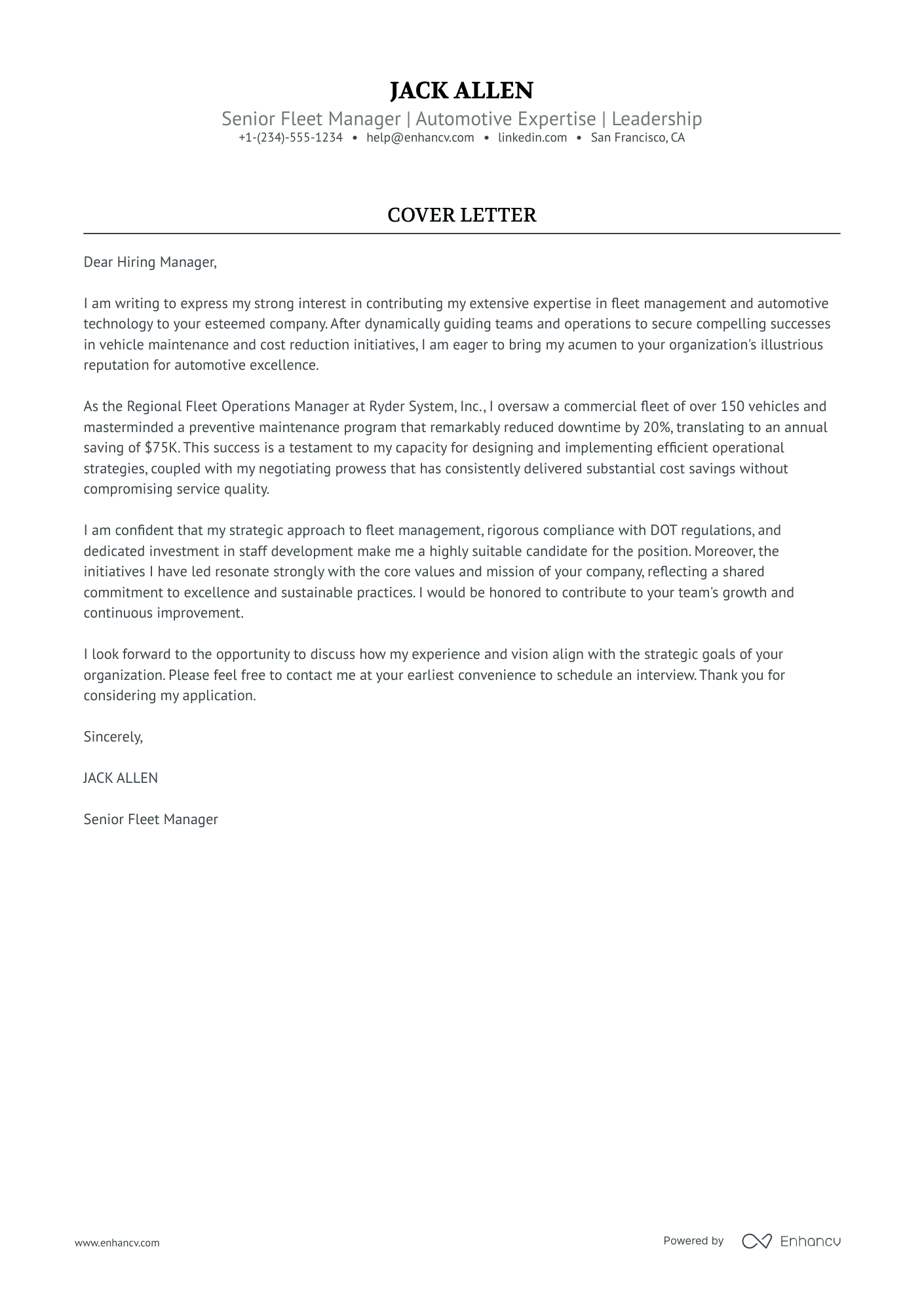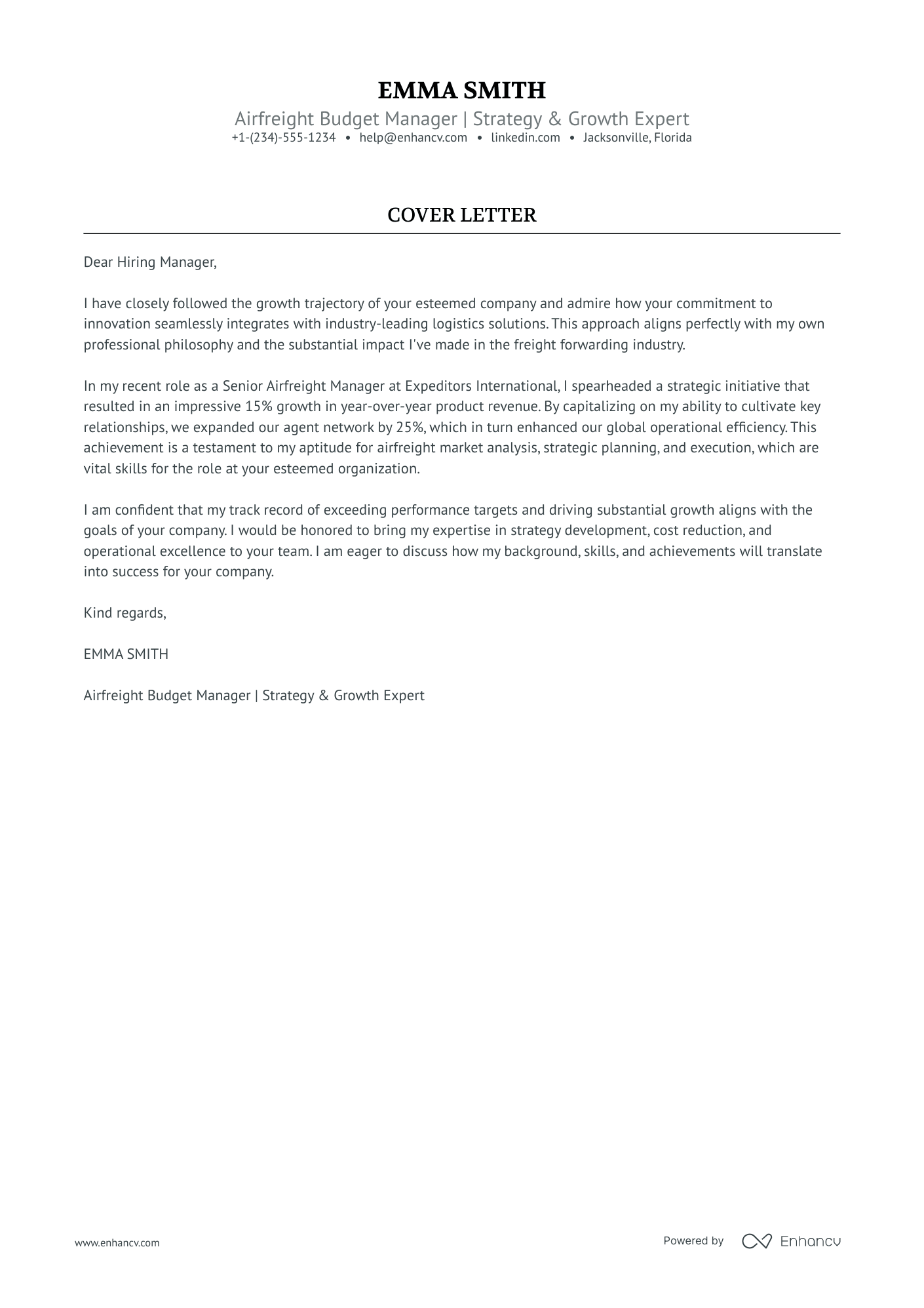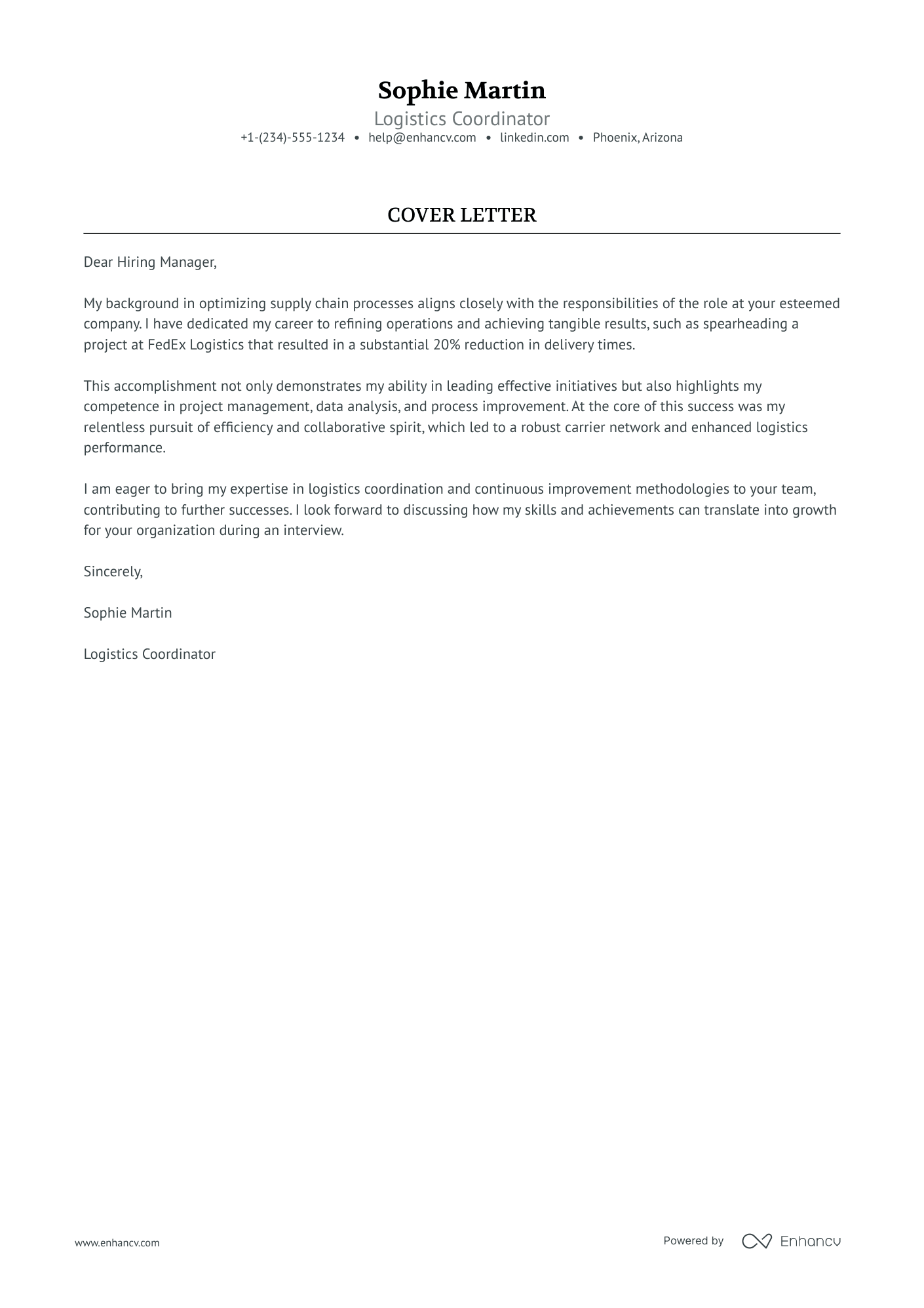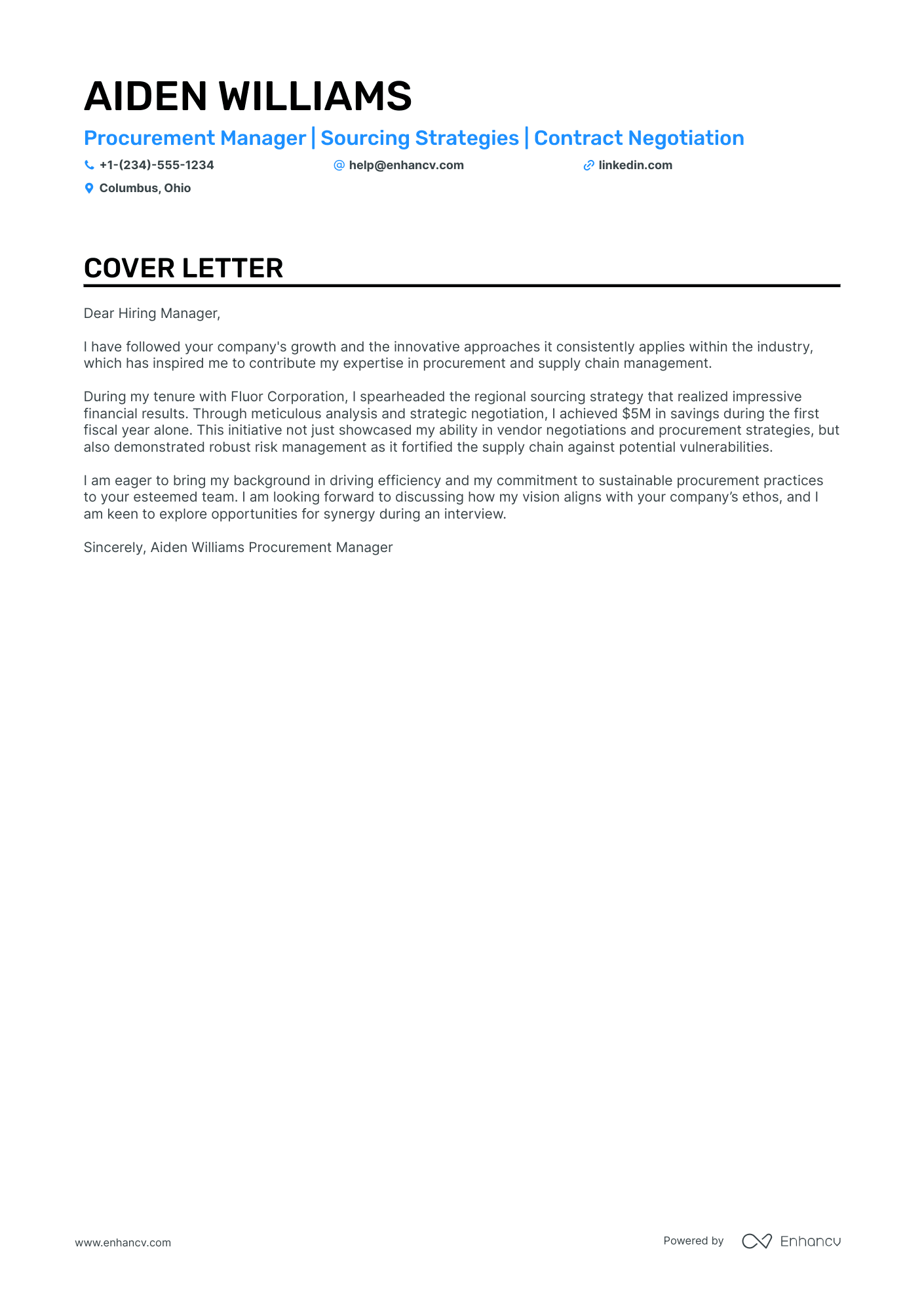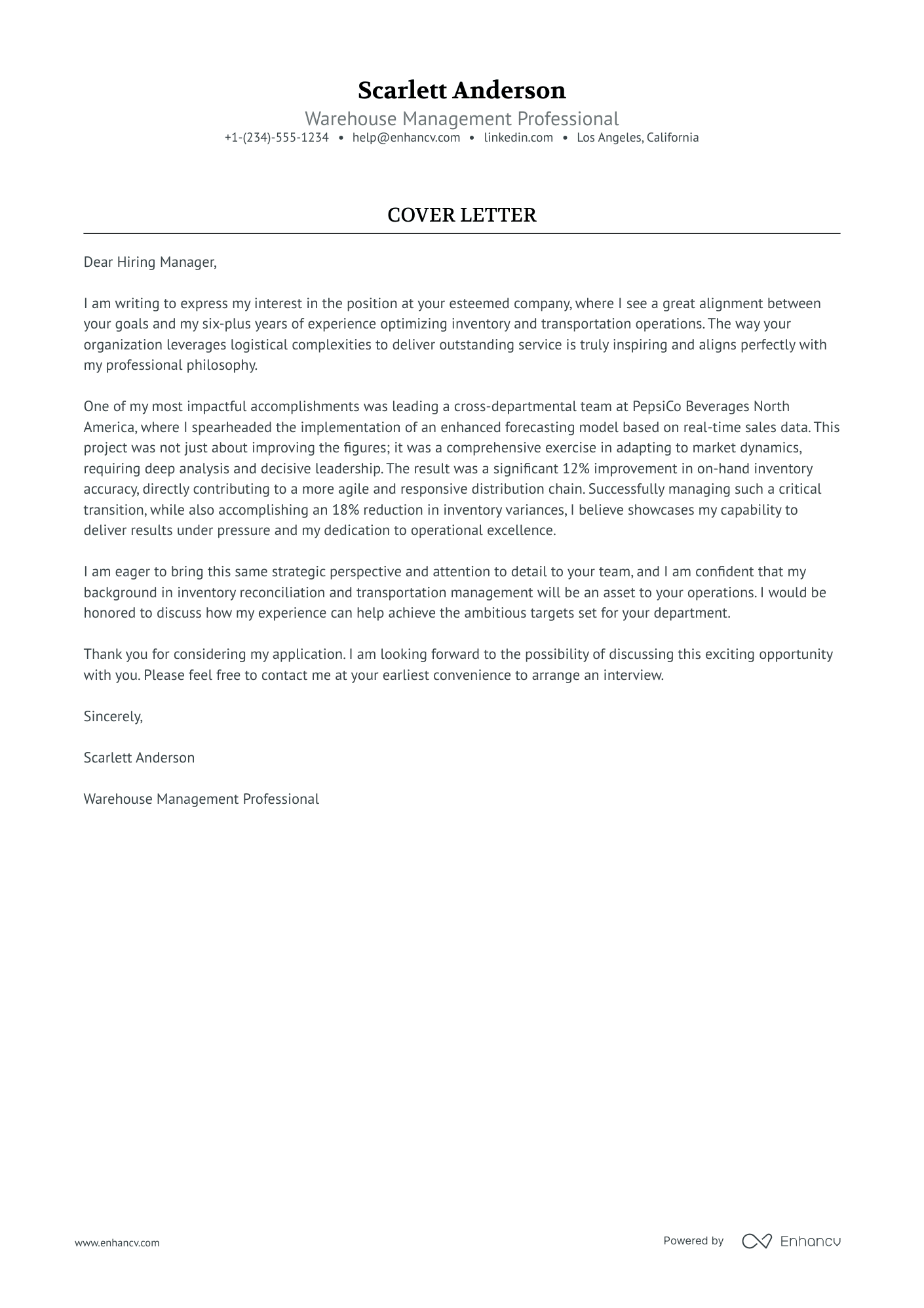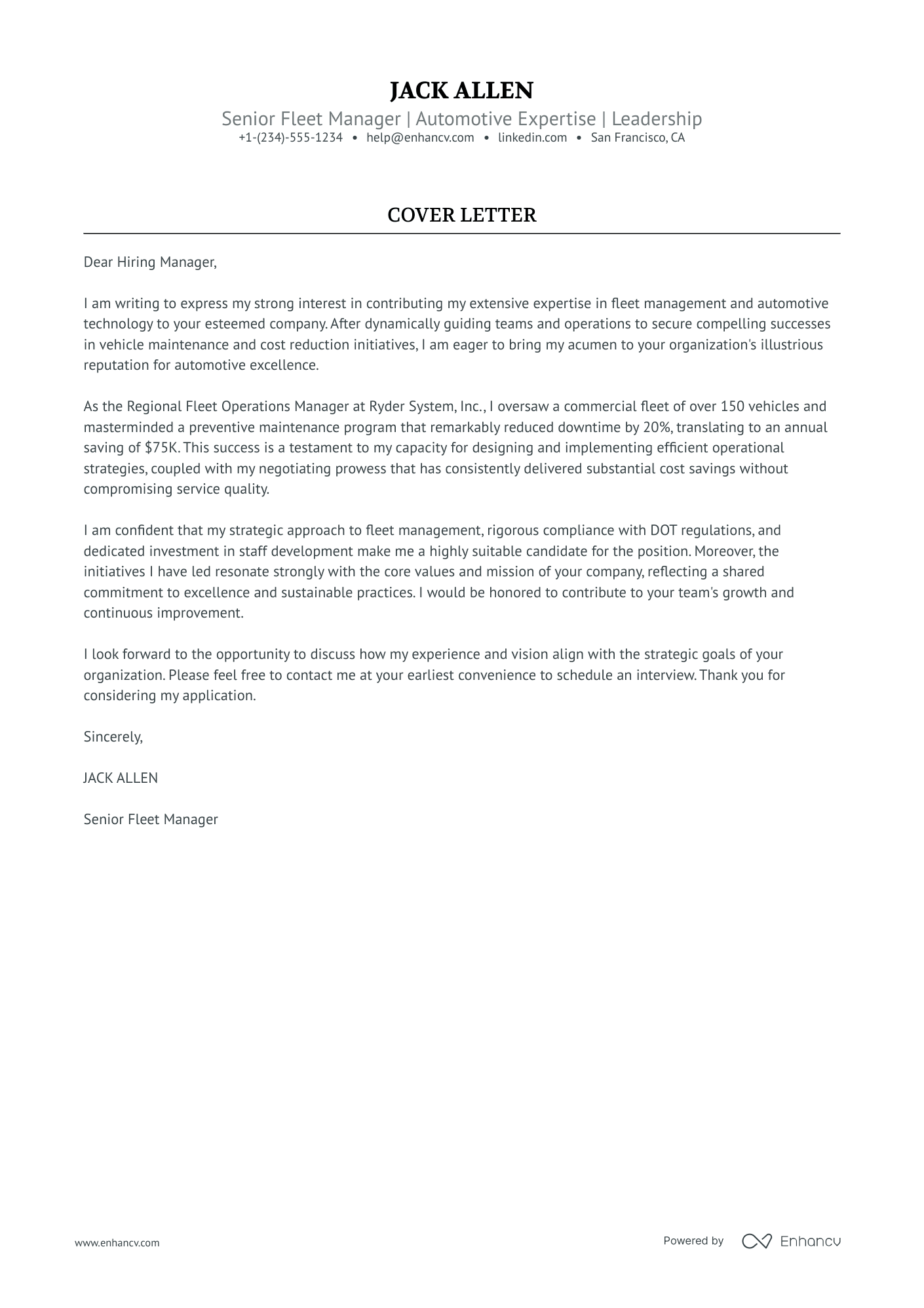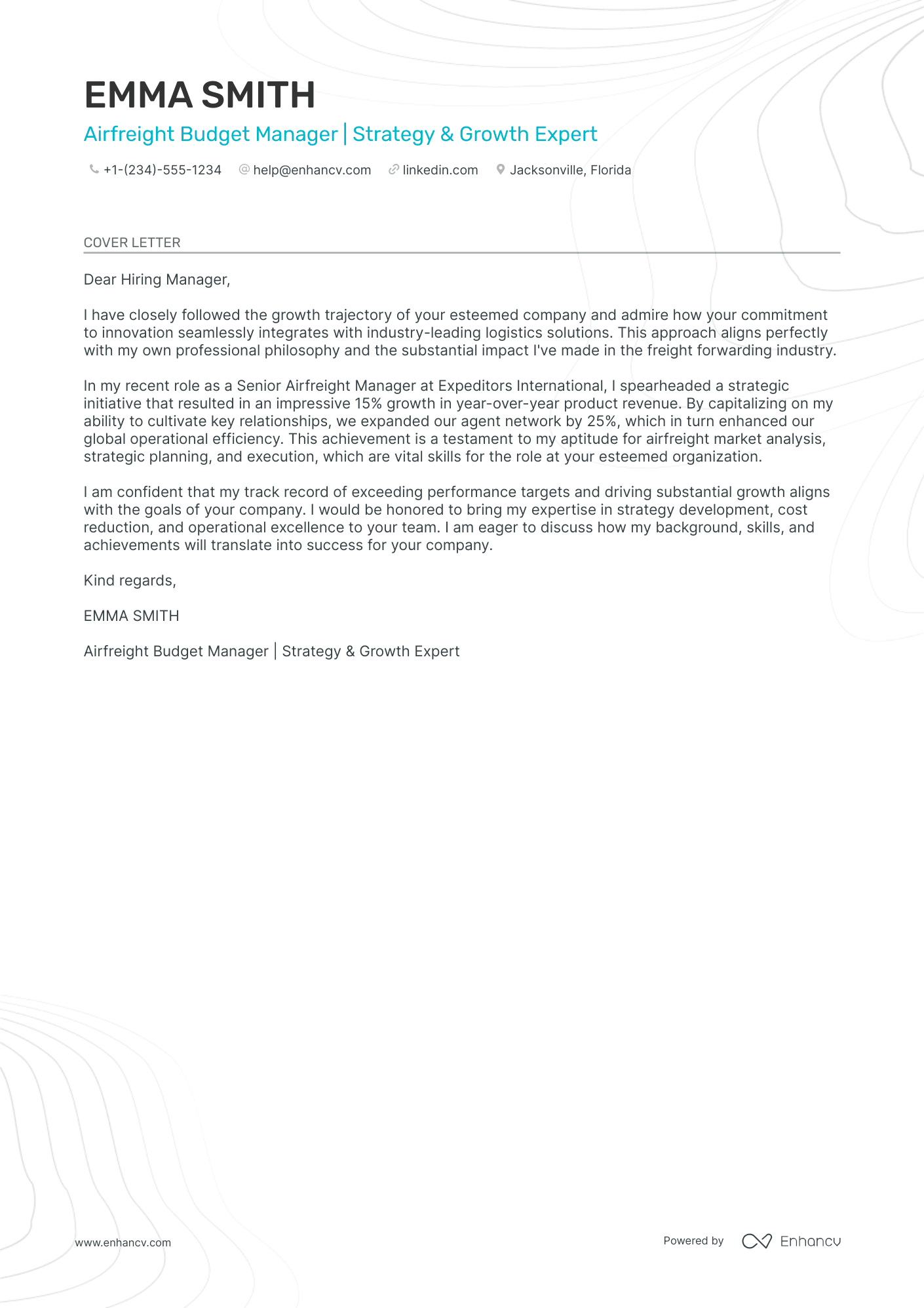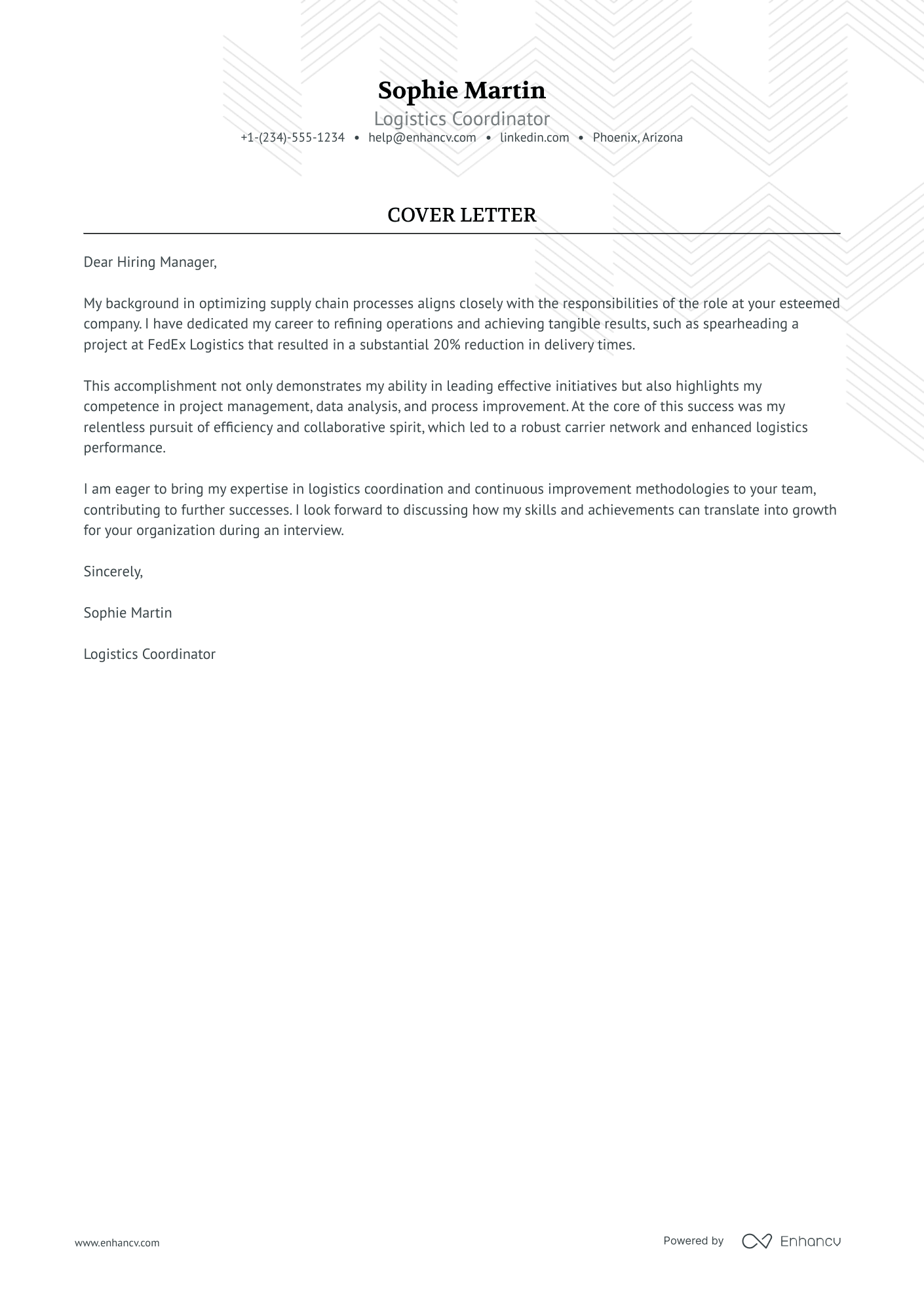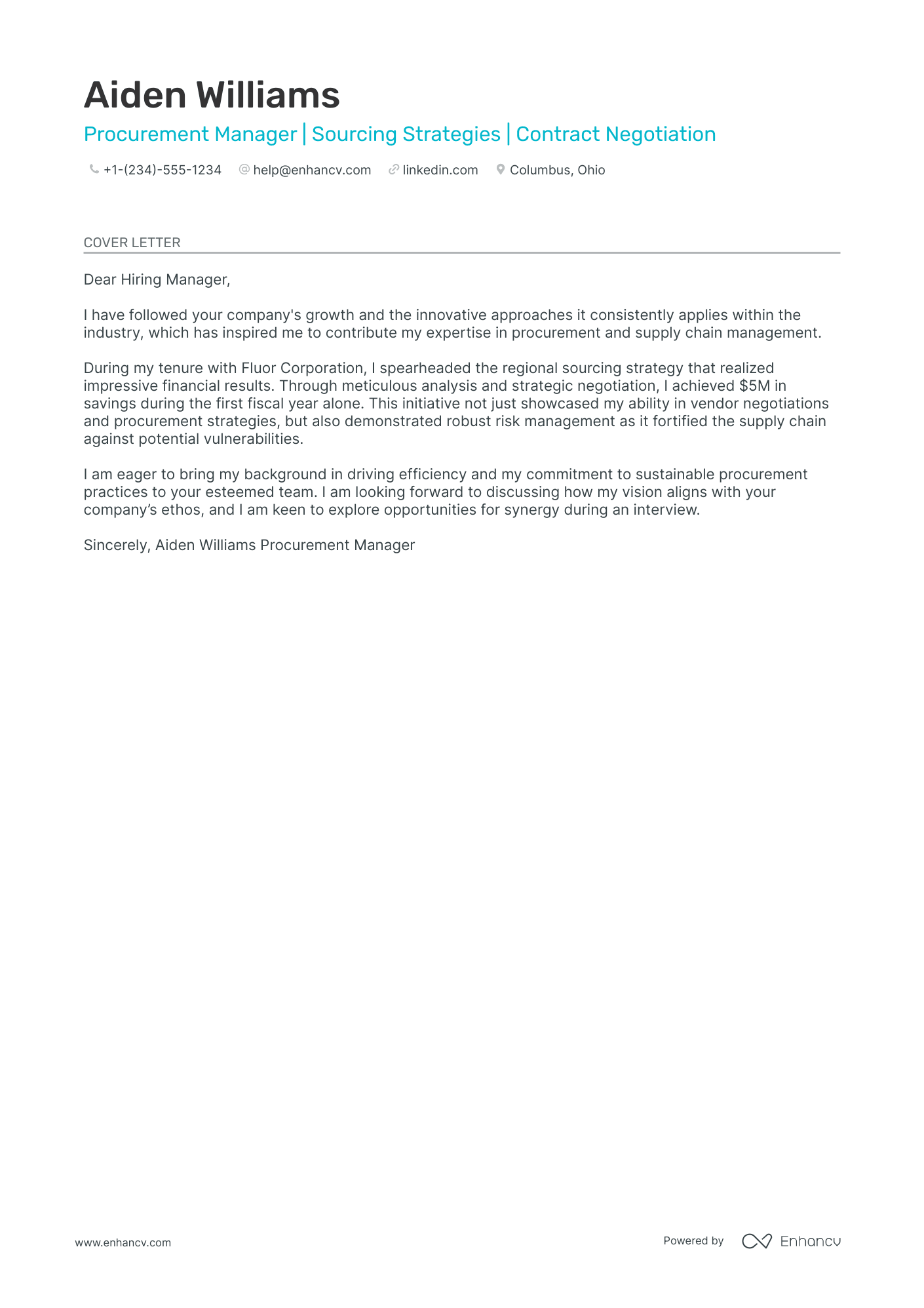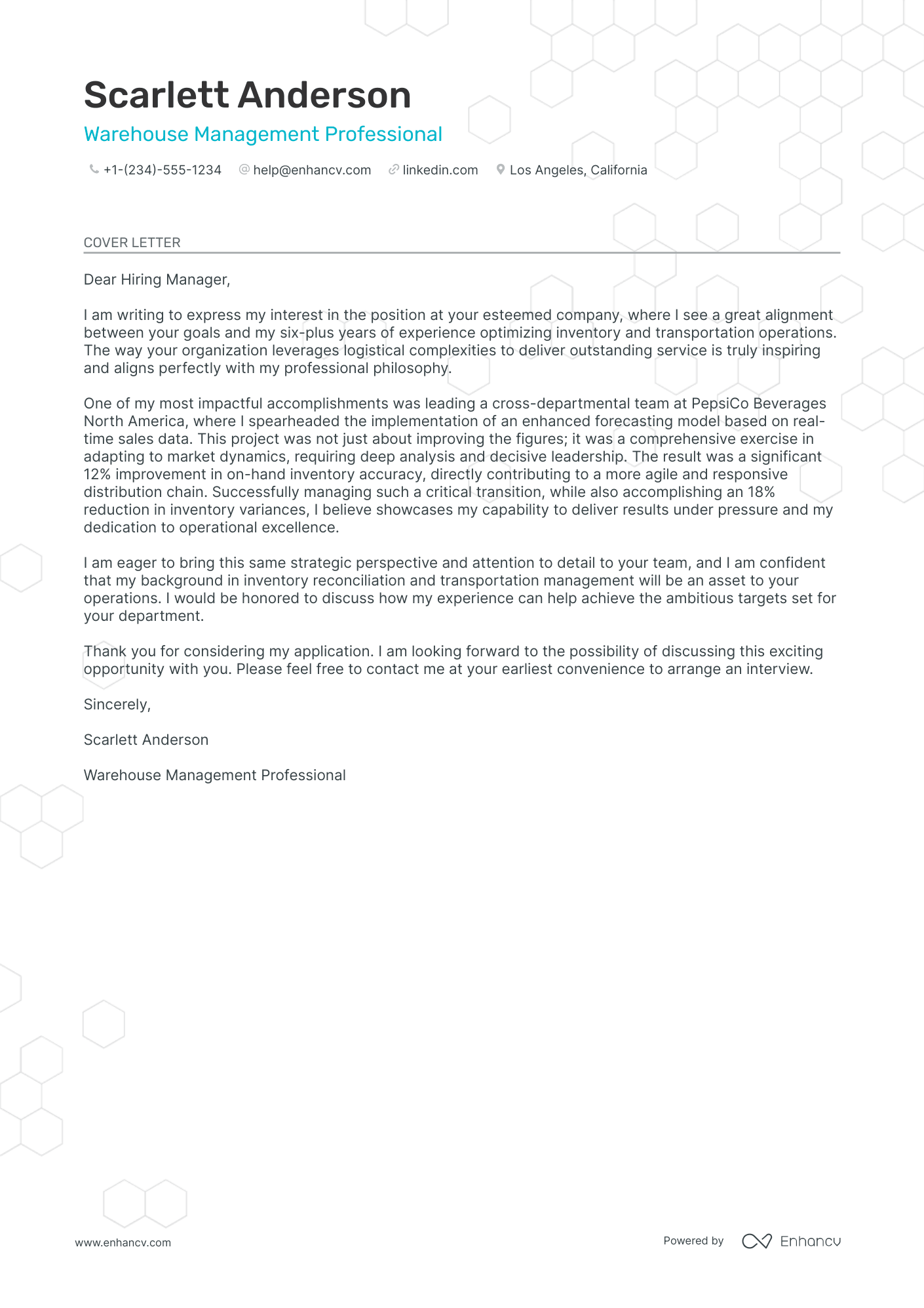Crafting a supply chain manager cover letter can be daunting, especially after you've been on the job hunt and realize it's a critical piece of your application puzzle. This isn't mere repetition of your resume; it's your chance to spotlight that one stellar achievement and weave a compelling professional narrative. We'll guide you in striking a balance between formality and originality, steering clear of clichés, and ensuring your letter makes a powerful impression—all within the crucial one-page limit.
- Introduce your profile to catch recruiters' attention;
- Use professional templates and examples to make sure your supply chain manager cover letter follows the best industry standards;
- Settle on your most story-worthy achievement to shine a light on what makes your application unique;
- Write a supply chain manager cover letter, even when you lack professional experience.
Ready to start with the basics: upload your resume to Enhancv's AI, below, to see the supply chain manager cover letter it would write for you.
If the supply chain manager isn't exactly the one you're looking for we have a plethora of cover letter examples for jobs like this one:
- Supply Chain Manager resume guide and example
- Warehouse Clerk cover letter example
- Production Planner cover letter example
- Warehouse Manager cover letter example
- Vendor Manager cover letter example
- Carpenter cover letter example
- Distribution Manager cover letter example
- Manual Tester cover letter example
- Fedex cover letter example
- Warehouse Supervisor cover letter example
- Inventory Supervisor cover letter example
Drop your resume here or choose a file.
PDF & DOCX only. Max 2MB file size.
Supply chain manager cover letter example
Sophie Martin
San Antonio, Texas
+1-(234)-555-1234
help@enhancv.com
- Demonstrate proven results: The cover letter highlights a past achievement (25% increase in production efficiency) that underscores the candidate's ability to deliver quantifiable results, which is critical in supply chain management roles.
- Link experience to company values: The candidate aligns personal professional principles with the company's values (efficiency and sustainability), showing a good fit between their experiences and the company ethos.
- Showcase leadership and teamwork: Mentioning leading a team through a transformational project reflects the candidate's leadership skills, which are essential for managerial positions in supply chain management.
- Invite further discussion: The cover letter closes with an invitation for an interview, prompting the hiring manager to consider the candidate for a discussion about how their skills can benefit the company specifically.
Designing your supply chain manager cover letter: what is the best format
Let's start with the basics, your supply chain manager cover letter should include your:
- Header
- Greeting
- Introduction
- Body paragraph
- Closing statement
- Signature (that's not a must)
Next, we'll move to the spacing of your supply chain manager cover letter, and yes, it should be single-spaced (automatically formatted for you in our cover letter templates).
Don't go for a old-school font (e.g. Arial or Times New Roman), but instead, pick an ATS-favorite like Chivo, Volkhov, or Raleway, to stand out.
Our cover letter builder is also set up for you with the standard one-inch margin, all around the text.
Finally, ensure your supply chain manager resume and cover letter are in the same font and are submitted in PDF (to keep the formatting in place).
P.S. The Applicant Tracker System (or ATS) won't be assessing your [job] cover letter, it's solely for the recruiters' eyes.
Writing a cover letter is easy with our free cover letter generator. Make one in seconds from your resume.
The top sections on a supply chain manager cover letter
- Header: This section includes the candidate's contact information, the date, and the recipient's details, providing the necessary context and professionalism expected for a supply chain manager cover letter.
- Opening Greeting: A personalized salutation addressing the hiring manager by name shows attention to detail and personalization, which are critical for a role that manages complex relationships within a supply chain.
- Introduction: The introductory paragraph should grab the reader's attention by succinctly stating the candidate's relevant experience in supply chain operations, strategic sourcing, or logistics management, demonstrating immediate value to the recruiter.
- Body of the Letter: This section delves into specific experiences with supply chain optimization, vendor management, inventory control, and cost reduction strategies, highlighting the candidate’s capability to tackle challenges relevant to the supply chain manager role.
- Closing and Call to Action: The closing should reiterate interest in the position, summarize qualifications, and include a proactive call to action that invites further discussion, reflecting the supply chain manager’s skills in negotiation and closing deals.
Key qualities recruiters search for in a candidate’s cover letter
- Proven expertise in supply chain optimization techniques: Evidence of skills in streamlining operations to improve efficiency and reduce costs is highly valued.
- Strong understanding of logistics and inventory management: Demonstrates the ability to manage physical goods movement and storage effectively.
- Experience with supply chain software and tools: Shows adaptability and technical proficiency in using industry-standard platforms for better supply chain planning and execution.
- Crisis management and problem-solving skills: Essential for dealing with disruptions and ensuring the supply chain remains resilient under stress.
- Excellent vendor and stakeholder relationship management: Critical for negotiating effectively and maintaining productive partnerships throughout the supply chain.
- Knowledge of compliance and regulatory standards: Indicates awareness of and adherence to laws and regulations that govern international trade and supply chain operations.
Greeting recruiters with your supply chain manager cover letter salutation
What better way to start your conversation with the hiring manager, than by greeting them?
Take the time to find out who the professional, recruiting for the role, is.
Search on LinkedIn, the company website. And for those still keen on making a fantastic first impression, you could even contact the organization, asking for the recruiter's name and more details about the job.
Address recruiters in the supply chain manager greeting by either their first name or last name. (e.g. "Dear Anthony" or "Dear Ms. Smarts").
If you're unable to discover the recruiter's name - don't go for the impersonal "To whom it may concern", but instead use "Dear HR team".
List of salutations you can use
- Dear Hiring Manager,
- Dear [Company Name] Team,
- Dear [Department Name] Recruiter,
- Dear Mr./Ms. [Last Name],
- Dear [Job Title Search Committee],
- Dear [Company Name] Human Resources,
The supply chain manager cover letter introduction: focusing on your unique value, with a creative twist
You are not the only one wondering how to start your supply chain manager cover letter. Those first two sentences introduce your profile and should be memorable.
No pressure.
When beginning your supply chain manager cover letter, immediately point out the unique value of working with you. In other words, what you promise to bring to the role by using your past track record of success.
Start your supply chain manager cover letter with a creative twist by telling a joke or stating something relatable. Select this type of introduction only if it aligns with the company culture.
How to select your best achievement for the middle, or the supply chain manager cover letter body
You probably feel exhausted by this point in your application: you've dived into all the details of your success and skills in your supply chain manager resume.
What else can you include in your supply chain manager cover letter body?
Well, for starters, the next three to six paragraphs should show you further value as a professional. Or, why should recruiters choose you?
Think back on a noteworthy achievement that answers key job requirements and dive deep.
Structure your supply chain manager cover letter middle as you'd a story: following chronological logic and highlighting outcomes, thanks to skills.
At the end of the day, you'd want recruiters to be able to see you as the best candidate for the role and understand more about who you are and what makes your success unique (and valuable to the role).
Thinking about the closing paragraph of your supply chain manager cover letter
Before your signature, you have extra space to close off your supply chain manager cover letter.
Use it to either make a promise or look to the future.
Remind recruiters how invaluable of a candidate you are by showing what you plan to achieve in the role.
Also, note your availability for a potential next meeting (in person or over the telephone).
By showing recruiters that you're thinking about the future, you'd come off as both interested in the opportunity and responsible.
Keep this in mind when writing your zero experience supply chain manager cover letter
Even though you may not have any professional experience, your supply chain manager cover letter should focus on your value.
As a candidate for the particular role, what sort of skills do you bring about? Perhaps you're an apt leader and communicator, or have the ability to analyze situations from different perspectives.
Select one key achievement from your life, outside work, and narrate a story that sells your abilities in the best light.
If you really can't think of any relevant success, you could also paint the picture of how you see your professional future developing in the next five years, as part of the company.
Key takeaways
Your supply chain manager cover letter is your best shot at standing out by showing your motivation and the unique skills you'd bring to the job:
- Chose no more than one achievement, which you'd be talking about in the body of your supply chain manager cover letter, by focusing on skills and outcomes;
- Address recruiters with their first or last name, or "Dear Hiring Manager" in your supply chain manager cover letter greeting;
- Introduce in no more than two sentences what makes your profile unique (perhaps it's your motivation, enthusiasm, or appreciation of the company you're applying for);
- Select the same font you have used in your resume (avoid Times New Roman and Arial, as most candidates tend to invest in them);
- Close your supply chain manager cover letter with a promise of how you see yourself growing in the company and the benefits you'd bring about.
Supply Chain Manager cover letter examples
By Role
